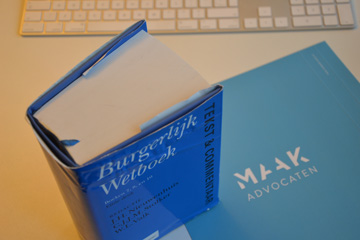
In a recent decision of the District Court of Gelderland, the issue was whether the parties had an exclusive distribution agreement for a limited period or a (non-exclusive) distribution agreement for an indefinite period, and the benchmarks for the termination of an ongoing service agreement were also briefly outlined. Our Dutch distribution lawyer discusses the case and the issue of giving effect to an earlier contract after its term has expired.
Disputes over the termination of Dutch long-term contracts
In our practice, we see many disputes about the termination of long-term contracts such as agency, franchise, and distribution contracts. In contrast to agency and franchise agreements, there is no section in the Dutch Civil Code dealing with distribution agreements. It is also good to be aware that there are important differences between, for example, agency and distribution.
When is a distribution agreement under Dutch law formed?
A distribution agreement is an agreement between a supplier of products and a party who purchases and resells those products, the distributor. In other words, the distributor purchases and resells these products for its own account and risk.
According to Article 6:217(1) of the Dutch Civil Code, a contract is generally formed by an offer and its acceptance:
Article 6:217 Offer and acceptance (permissive law)
– 1. An agreement comes to existence by an offer and its acceptance.
– 2. Articles 6:219 up to and including 6:225 apply to the formation of an agreement, unless the offer, another juridical act or common practice implies differently.
This article reflects the normal way in which a contract is concluded. The answer to the question whether a (distribution) agreement has been concluded between the parties depends on what the parties have declared to each other and what can be reasonably inferred from their declarations in the given circumstances. Offer and acceptance need not be express; they may take any form and may be implied by one or more acts.
What does the Dutch court say about actual performance without a signed distribution contract?
In the present case, it is established that draft distribution agreements were not signed and that proposals made were consistently rejected. Therefore, it cannot be established that there was an agreement between the parties on (inter alia) the duration of the distribution agreement and the degree of exclusivity of the distribution relationship by the text of the draft distribution agreement. It is neither stated nor apparent that the parties reached an agreement (oral or otherwise) on (inter alia) the duration and degree of exclusivity of a distribution agreement after the aforementioned e-mail exchange.
The mere fact that the Distributor appears to have been the sole distributor of the Supplier’s products in its territory and that, therefore, contrary to what the Distributor assumes, there was an exclusive distribution relationship, does not mean that there was a consensus between the parties as to the exclusive nature of the distribution relationship. This means that, at this stage, it cannot be concluded that there is (after all) an alleged exclusive distribution agreement between the parties for a certain period which, by its nature, cannot be terminated.
Distribution agreement for an indefinite period under Dutch law?
The preceding, however, does not alter the fact that it is undisputed that the parties have been doing business for many years and that there has been an ongoing commercial relationship between them which, for these proceedings, must be qualified as a non-exclusive distribution agreement for an indefinite period.
Pending the conclusion of new agreements, the parties continued to do business with each other “as before” and, although the exact content of this agreement cannot be determined in the context of these preliminary proceedings, it is clear from the documents submitted and the oral submissions that it involved more than the occasional purchase of (the same) products.
There was a consensus between the parties on the sales territory, and the parties discussed (by e-mail) an (increase of the) minimum purchase obligation.
Lawful termination of Dutch distribution agreement?
The next question is whether the supplier has validly terminated the Dutch distribution contract, existing between it and the distributor. A duration agreement concluded for an indefinite period, such as the agreement in question, is in principle terminable, even if the law and the agreement do not provide for a regulation of termination, as in the present case.
This does not alter the fact that a perpetual contract concluded for an indefinite period can be non-cancellable according to the parties’ intention, but the distributor has not argued this, or at least has not substantiated it.
The starting point is therefore that the agreement is terminable. If the agreement is terminable, however, the requirements of reasonableness and fairness in connection with the nature and content of the agreement and the circumstances of the case may mean that termination is only possible if a sufficiently serious ground for termination exists. It may follow from the same requirements, also in connection with the nature and content of the contract and the circumstances of the case, that a certain notice period must be observed or that the termination must be accompanied by the offer to pay compensation or damages (see: SMQ / Goglio jurisprudence).
It is not disputed that the Distributor has invested a lot of time and money over a number of years in, inter alia, setting up a commercial network in the territory by, inter alia, organising promotional and sales activities, recruiting specialised personnel, attending training courses, carrying out market research and visiting (potential) customers in the territory and taking care of all necessary (import) paperwork, licences and customs formalities.
It is also established that the distributor, on behalf of the supplier, participated in public tenders in countries within its territory and that the supplier was at least aware of this and also issued Letters of Authorisation (LoAs) when required for a valid tender in countries within the territory.
How did the distribution case end?
Because the termination was not by the applicable terms, the contract continues. This is different from, for example, an agency, where the contract always ends, and the dispute is about damages. In this case, the supplier had to continue supplying until a valid termination had been given.
The case is particularly interesting because it shows that the continuation of an existing contract can result in a contract for an indefinite period, even if negotiations for a new contract are at an advanced stage. In addition, the interim judge again clearly explains the applicable doctrine regarding the termination of long-term contracts.
Dutch law firm specialized in Distribution law
For any legal inquiries or support in the Netherlands regarding Dutch distribution law, please feel free to contact our adept team at MAAK Advocaten. Committed to excellence, our Dutch lawyers provide superior legal services tailored to your distinct needs. You can reach our law firm in the Netherlands through our website, by email, or phone.
Our approachable and skilled staff at MAAK Attorneys will be delighted to assist you, arranging a meeting with one of our specialized attorneys in the Netherlands. Whether you need a Dutch litigation attorney or a Dutch contract lawyer in Amsterdam, we are eager to guide you through the legal intricacies and secure the most favorable results for your situation.







